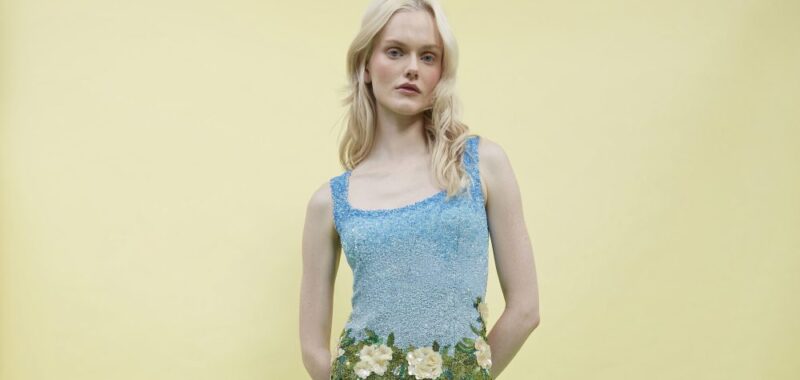In the luxury clothing market, high-end products don’t always equate to businesses’ ethical or sustainable practices; many brands still have a long way to go with their lack of transparency. While greenwashing has been an ongoing practice of the fashion industry, many smaller and emerging brands have set out to give consumers the much-needed change they’ve been seeking out — without sacrificing the makings of beautiful products.
Meet Vidur Adalkha, founder of the New York-based brand Là Fuori, who set out to do things differently. After getting his master’s degree in fashion design at FIT, Adalkha returned to his home in India and became a designer in a factory, handling accounts for Anne Taylor and Tory Burch. Burch’s team took an interest in him and Adalkha started working with the brand’s New York team directly. Later, he worked with Costco on global sourcing for the menswear department and Walmart as the director of production and sourcing alongside product development.
Throughout Adalkha’s various jobs, he saw “whole containers being dumped in waters because they were excessive inventories” in Panama. He said the experience hurt him personally since it was not only 9 months of his work but thousands of other workers’ labor. While everyone was paid for their contributions, Adalkha said the loss of the human artwork and essence that goes into making clothes was a major turn-off — especially as consumers “don’t know how [the product] is being [made] or what is being done.”

Là Fuori’s pre-fall 2025 collection.
While Adalkha traveled across Asia, he worked closely with factories to develop products in China, Vietnam, Cambodia, Bangladesh, Myanmar and India. On a trip to Shanghai, Adalkha had a chance encounter with Riccardo Bennidini, a former broker of ancient artifacts in Venice. With both Adalkha and Bennidini’s penchant for traveling and culture, the duo started the brand in 2020, which takes its name from their conversation in Shanghai; Là Fuori is the Italian translation for “out there.”
Là Fuori sets itself apart — beyond its eye-catching, brightly colored designs and embroidery — with its usage of vegetarian Muga silk, recycled materials for its embroideries and carbon-free dyes. Another pillar of the brand’s accessibility is its size inclusivity and custom sizing at no additional cost to the brand. Adalkha knows firsthand what it’s like to go into a shop and find something he connects with but is unable to purchase because of limited sizing or unaffordable pricing; he absorbs the pricing of making the brand’s triple XL and four times XL sizes to ensure customer satisfaction and garner loyalty.
One major impetus behind the brand’s launch was to directly tell consumers about who are the people who make their clothing. Adalkha said he wants his products to be ones that people cherish and can be re-worn time and time again.

Vidur Adalkha
“I want to tell the stories of people out there, stories of cultures out there,” Adalkha told WWD. “It’s a beautiful experience where I could really transform and tell the tales of people whom I meet at the factory level, whom I meet in my sourcing operations, the actual artisans and the workers who were working for the product and give their stories a platform to enhance it.”
When designing a collection, Adalkha takes inspiration from his travels but, moreover, he meets with the local community artisans. Adalkha saw village artisans’ craft dying and their refusal to share with the next generation because of their lack of proper compensation. He gives back to the artisan community around the globe by empowering and educating them on how to make money through their art; he currently works with more than 300 artisans in villages around the world.
“I work with the artisans to develop prints and artworks,” said Adalkha. “Every artwork we hand paint and develop in this way. They don’t just collaborate with me for that particular project. They can adapt their work and really make their work more popular, by selling it better in a contemporary way. What I’m trying to build is a community of people who are interdependent on each other and they benefit from each other.”

Là Fuori’s pre-fall 2025 collection.
Adalkha also owns his own factory in India, employing 140 people — which is a rarity among most fashion brands. He built his factory to continue evolving with his brand, making it the central hub for all aspects of the brand’s sourcing and artisanal designs to come together. Beyond paying his artisans upfront higher than the market’s average labor rates by forgoing intermediaries, Adalkha shares 10 percent of his profits directly with the artisans to ensure their professional development and to continue carrying on the legacy of their culture’s craftsmanship.
Recently, Là Fuori has captured the attention of Revolve Clothing — the brand just launched online with the company this year. “When we discovered the brand, we were immediately drawn to the intricate feminine designs and mood-boosting color palette,” said Maddie Mark, fashion editor at Revolve. “Vidur’s artisanal embellishments combine perfectly with effortless silhouettes resulting in the perfect combination of breezy and luxe.”
The brand, whose prices range from $300 to $5,000, is carried seasonally in trunk shows at Moda Operandi, Harvey Nichols Dubai, Bloomingdale’s Dubai, Five Story in Palm Beach and Southampton and more. The brand is also set to launch in Neiman Marcus on Jan. 31. While the U.S. has been the major market for Là Fuori, Adalkha has seen interest in the Middle East.
“True sustainability isn’t just about materials; it’s about relationships. It’s understanding that artisans work best when they’re empowered to create in their own spaces, not conforming to a rigid system of production. It’s about challenging the idea that uniformity equals quality and celebrating the beauty of imperfection,” concludes Adalkha.

